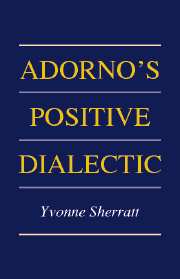Book contents
- Frontmatter
- Contents
- Preface
- Abbreviations
- Adorno's Positive Dialectic
- General Introduction
- PRELUDE TO ADORNO'S POSITIVE DIALECTIC
- Prelude I: Adorno's Intellectual Tradition: German Philosophy
- Prelude II: Adorno's Intellectual Tradition: Sigmund Freud
- ADORNO'S POSITIVE DIALECTIC: INTRODUCTION
- PART I NEGATIVE THESIS: THE DECLINE OF ENLIGHTENMENT
- PART II POSITIVE THESIS: THE REDEMPTION OF ENLIGHTENMENT
- Bibliography
- Index
Prelude I: Adorno's Intellectual Tradition: German Philosophy
Published online by Cambridge University Press: 10 August 2009
- Frontmatter
- Contents
- Preface
- Abbreviations
- Adorno's Positive Dialectic
- General Introduction
- PRELUDE TO ADORNO'S POSITIVE DIALECTIC
- Prelude I: Adorno's Intellectual Tradition: German Philosophy
- Prelude II: Adorno's Intellectual Tradition: Sigmund Freud
- ADORNO'S POSITIVE DIALECTIC: INTRODUCTION
- PART I NEGATIVE THESIS: THE DECLINE OF ENLIGHTENMENT
- PART II POSITIVE THESIS: THE REDEMPTION OF ENLIGHTENMENT
- Bibliography
- Index
Summary
In Prelude I we offer a brief contextualising account of Kant's philosophical project. Hereafter, we detail the development of German philosophy after Kant from Hegel's philosophy of history, Marx, Lukacs and the Early Frankfurt School, to Adorno himself. We focus upon the key ideas in this strand of thought that were developed to form the Dialectic of Enlightenment.
ENLIGHTENMENT AND CRITIQUE
Kant
In introducing Kant, we focus upon the two principal aspects of his work which are later taken up by Adorno. These are, first, Kant's commitment to Enlightenment and second, the related Kantian project of critique.
Immanuel Kant, as we know, had a very specific project, itself influenced by certain strands of philosophical thinking. Writing after the many developments of seventeenth- and eighteenth-century rationalist and empiricist philosophy, he disliked the apparently ceaseless alterations and turns in thought, as developed within these traditions over time. In contrast, he would bring to a halt these precarious vascillating notions. To do this, the greatest luminary in German Thought sought to ground philosophy in reason which would end once and for all its historically variable character.
Kant aimed to create an ‘end’ to philosophy by solving the key philosophical problems of empiricist and rationalist debates, namely those in morality, metaphysics, and epistemology. To do this he developed, through his three great Critiques, the following: a comprehensive metaphysical system which attempted to accommodate the claims of empiricism alongside the claims of rationalism.
- Type
- Chapter
- Information
- Adorno's Positive Dialectic , pp. 24 - 49Publisher: Cambridge University PressPrint publication year: 2002



